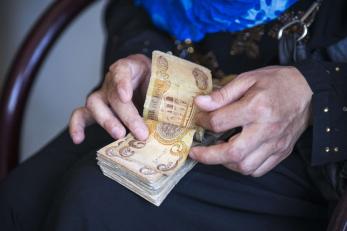Designing Cash Transfers for Economic Recovery in Iraq

If you receive 1,200 USD as one transfer or the same value of money spread over three months, would you spend it differently? If you know that these transfers are for a limited period only, how would you prioritize present-day needs versus those in the future? If you learn from your peers’ strategies on meeting competing needs, would you apply this learning?
Mercy Corps and Oxfam, partners in the Cash Consortium of Iraq (CCI) asked these questions of 819 Iraqi households in conflict-affected Anbar, Salah-al-din and Ninewa governorates.
As part of the CCI’s ongoing multipurpose cash assistance program, we gave one group of Iraqis 1,200 USD as one lump-sum transfer; a second group received 400 USD every month for three months; and a third group received 200 USD for two months and a third transfer of 800 USD. We enrolled half of all these groups in a financial health education training where they interacted with us and their peers to learn on what works to manage multiple priorities; and strategies to save, repay debt and invest in a livelihood. All participants were randomly assigned to these different groups.
Here’s what we learned.
- It didn’t matter to Iraqi men and women if cash was provided as one lump-sum or spread over three months. Across all cash transfers, Iraqis reported using the cash to meet immediate food needs and invest in shelter, health and education expenses. But, the timing and sequencing of these expenses differed. Lump-sum payments encouraged Iraqis to meet large one-off expenses like medical needs or shelter repairs. Receiving cash more regularly helped meet ongoing food expenses.
- Iraqis not only used the cash for consumption needs, but also invested to protect their future. Iraqi men and women purchased a variety of assets such as televisions, microwaves, cars and livestock. Household assets have protective benefits: they can be sold if there are shocks in the future; cars and livestock also help generate income. Being able to stabilize household consumption with their cash transfers appeared to be important. Iraqis who received cash were better able to maintain regular employment, compared to their peers who did not receive a transfer. But neither assets nor employment translated into additional income during the study period.
- Participating in the financial health training, and learning from, and with their peers appeared to have a range of benefits. Iraqi men and women reported mimicking their peers’ strategies to regularly repay debt, to maintain creditworthiness so they could borrow again; others said their peers’ success stories inspired them to engage in an economic activity. Participating in the financial health training led to one more person employed for every ten households, over and above the impact of cash alone. Further, while receiving cash improved Iraqis’ psychosocial well being, the effects were greater for those who received cash and the additional financial health training, compared to those who only received cash.
Want to find out more?
- If you’re short on time, read the executive summary here.
- If you manage cash programs and want to know what this means for cash implementation, read our practitioners’ paper here.
- If you want all of the details, read our technical report here.
